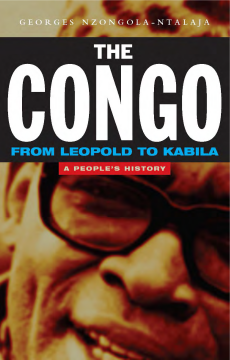
Additional Information
Book Details
Abstract
The people of the Congo have suffered from a particularly brutal colonial rule, American interference after independence, decades of robbery at the hands of the dictator Mobutu and periodic warfare which continues even now in the East of the country. But, as this insightful political history makes clear, the Congolese people have not taken these multiple oppressions lying down and have fought over many years to establish democratic institutions at home and free themselves from foreign exploitation; indeed these are two aspects of a single project.
Professor Nzongola-Ntalaja is one of his country's leading intellectuals and his panoramic understanding of the personalities and events, as well as class, ethnic and other factors, make his book a lucid, radical and utterly unromanticized account of his countrymen's struggle. His people's defeat and the state's post-colonial crisis are seen as resulting from a post-independence collapse of the anti-colonial alliance between the masses and the national leadership .
This book is essential reading for understanding what is happening in the Congo and the Great Lakes region under the rule of the late President Kabila, and now his son. It will also stand as a milestone in how to write the modern political history of Africa.
Georges Nzongola-Ntalaja is a renowned scholar of African politics and an international consultant specializing in public policy, governance and conflict-related issues. Past President of the African Studies Association of the United States (ASA) and of the African Association of Political Science (AAPS), Professor Nzongola is the author of several books and numerous articles on African politics, development, and conflict issues. His major work, The Congo from Leopold to Kabila: A People's History, won the 2004 Best Book Award of the African Politics Conference Group (APCG), an organization of American political scientists specializing on Africa.
Table of Contents
| Section Title | Page | Action | Price |
|---|---|---|---|
| Cover | Front cover | ||
| About this Book | i | ||
| About the Author | ii | ||
| Title | iii | ||
| Copyright | iv | ||
| Contents | v | ||
| Preface and Acknowledgements | vii | ||
| Abbreviations and Acronyms | xii | ||
| Name Equivalency | xiv | ||
| Map of the Democratic Republic of the Congo | xvi | ||
| Introduction | 1 | ||
| The Quest for Freedom and Prosperity | 2 | ||
| The Congolese Democracy Movement in Historical Perspective | 4 | ||
| Notes | 10 | ||
| 1 Imperialism, Belgian Colonialism and African Resistance | 13 | ||
| Imperialism and the Establishment of European Rule in the Congo | 14 | ||
| The Belgian Colonial System | 26 | ||
| African Resistance to Colonial Rule | 41 | ||
| Notes | 54 | ||
| 2 The Struggle for Independence | 61 | ||
| The Social Basis of Decolonization in the Belgian Congo | 61 | ||
| Table 2.1 Indigenous enterprises and monetary income | 70 | ||
| Table 2.2 Number of African wage earners, 1954–57 | 72 | ||
| Table 2.3 Structure of the Congolese wage-labour force, by sector | 72 | ||
| The Anticolonial Alliance and the Independence Struggle | 77 | ||
| Notes | 89 | ||
| 3 The First Congo Crisis | 94 | ||
| The Crisis of Decolonization, 1960–65 | 95 | ||
| The United Nations and the Congo Crisis | 112 | ||
| Notes | 118 | ||
| 4 The Second Independence Movement | 121 | ||
| The Birth of the Second Independence Movement | 121 | ||
| Strengths and Weaknesses of the Second Independence Movement | 126 | ||
| The Externally Led Counterinsurgency | 135 | ||
| Notes | 139 | ||
| 5 The Mobutu Regime: Dictatorship and State Decay | 141 | ||
| The Origins and Nature of the Regime | 142 | ||
| Instruments of Power | 152 | ||
| Notes | 169 | ||
| 6 The Struggle for Multiparty Democracy | 171 | ||
| The Fight against Mobutu’s Dictatorship and Reign of Terror | 171 | ||
| The Sovereign National Conference | 189 | ||
| Politics and the Institutions of the Democratic Transition | 198 | ||
| Notes | 208 | ||
| 7 Conflict in the Great Lakes Region | 214 | ||
| The Historical Context | 215 | ||
| The War of Partition and Plunder | 227 | ||
| Resistance and Repression in Kabila’s Congo | 240 | ||
| Notes | 248 | ||
| 8 Conclusion | 253 | ||
| Internal Political Limitations | 255 | ||
| External Constraints | 258 | ||
| The Way Forward | 262 | ||
| Chronology | 265 | ||
| Bibliography | 279 | ||
| Index | 294 |
